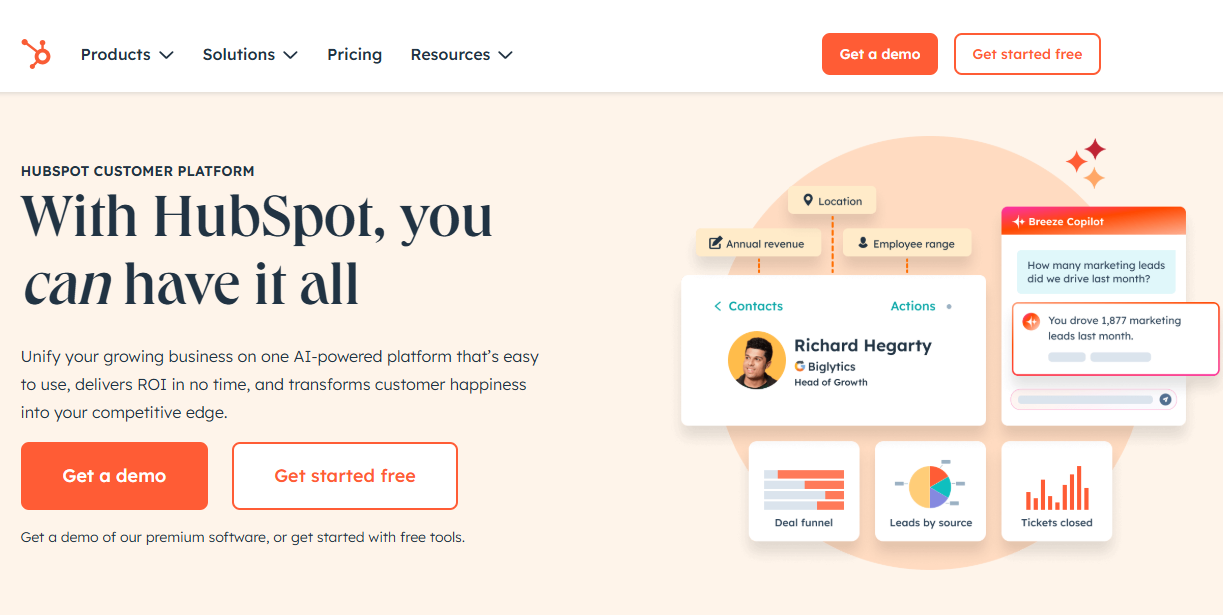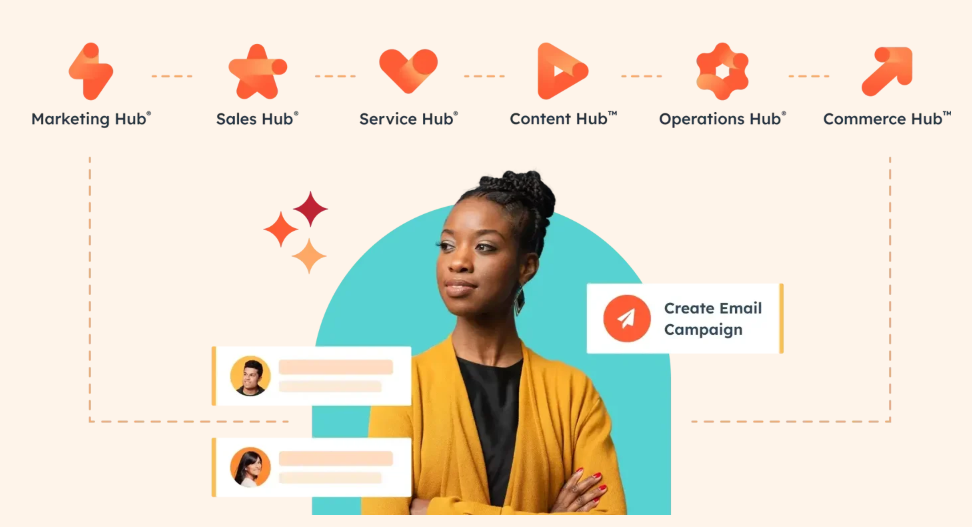HubSpot CRM Review: Features, Pricing, Pros & Cons (2025 Guide)

Struggling to keep up with leads, sales, and customer interactions? HubSpot CRM simplifies it all. This cloud-based platform helps businesses of all sizes manage relationships, automate marketing, and track sales pipelines effortlessly.
With its user-friendly interface and powerful tools, you can streamline operations, enhance customer service, and drive growth. Whether you’re in retail, real estate, or tech, HubSpot adapts to your needs with seamless integrations and AI-driven insights. Say goodbye to complex CRM systems and hello to a smarter way of working. Ready to boost efficiency and build stronger customer relationships?
Let’s explore what makes HubSpot a game-changer.
Overview

HubSpot CRM is more than just a customer management system—it’s a dynamic platform designed to align and streamline business operations. Okay, as you know, HubSpot is a popular CRM, but what does a CRM do? Find out in my CRM explanation.
By integrating essential functions under one roof, it eliminates the inefficiencies of juggling multiple tools and systems. Whether a business is just starting or scaling rapidly, HubSpot offers a flexible foundation that evolves alongside growth.
What sets HubSpot apart is its modular structure, allowing businesses to tailor the platform to their unique needs. Instead of a one-size-fits-all approach, companies can implement only the solutions that matter most to their operations. This adaptability ensures businesses remain agile, optimizing processes without unnecessary complexity.
At its core, HubSpot fosters collaboration across teams, creating a seamless flow of information between departments. Marketing, sales, customer support, and operations teams can work together effortlessly, ensuring a consistent and high-quality customer experience. With a centralized system in place, decision-making becomes more data-driven, allowing businesses to respond proactively to market demands and customer needs.
The platform also emphasizes ease of use, making it accessible for teams without requiring extensive technical expertise. Its intuitive design reduces the learning curve, enabling businesses to focus on growth rather than software management. As companies continue to evolve, HubSpot provides the stability and scalability needed to support long-term success.
Features

Unlike traditional CRM systems that focus solely on contact management, HubSpot goes beyond, offering modular solutions tailored to specific business needs. Whether you’re looking to attract customers, close deals, or provide top-tier support, each component of HubSpot works together to create a unified experience. Let’s explore how each HubSpot Hub contributes to business success.
Marketing Hub®: AI-Powered Marketing for Smarter Growth
Attracting and engaging customers is at the heart of any successful business. HubSpot’s Marketing Hub helps businesses generate leads and automate marketing efforts with AI-driven tools that enhance engagement and efficiency.
- Breeze Social Media Agent manages and optimizes social media interactions, ensuring businesses connect with their audience at the right time with relevant content. It eliminates manual posting and monitoring, making social engagement effortless.
- Marketing Automation streamlines repetitive tasks such as email campaigns and ad management, enabling businesses to maintain consistency while focusing on strategy.
- Analytics provides deep insights into marketing performance, allowing teams to refine their approach based on real-time data. Businesses can measure campaign success and make data-driven decisions that enhance ROI.
By leveraging AI and automation, the Marketing Hub transforms digital marketing efforts, making it easier to nurture leads and build meaningful customer relationships.
Sales Hub®: Closing Deals with Precision and Efficiency
Sales teams thrive on efficiency, organization, and insightful data. HubSpot’s Sales Hub provides a comprehensive platform where sales representatives can manage their pipelines and close deals faster.
- Sales Workspace serves as a centralized hub for managing sales tasks, communications, and deals, ensuring that sales reps stay organized and productive.
- Deal Management helps track and manage deals through different stages, providing clarity and structure to the sales pipeline.
- Breeze Prospecting Agent, powered by AI, identifies and prioritizes high-quality leads, making prospecting more effective and targeted.
By simplifying the sales process and leveraging AI-driven insights, the Sales Hub enables businesses to convert leads into customers with minimal friction.
Service Hub®: Elevating Customer Support and Satisfaction
Customer service is the backbone of any successful business. HubSpot’s Service Hub ensures that businesses provide timely, efficient, and personalized support to their customers.
- Omni-Channel Help Desk integrates multiple communication channels—including email, chat, and phone—into a single, easy-to-use platform, allowing customer service teams to manage inquiries seamlessly.
- Breeze Customer Agent is an AI-powered assistant that responds instantly to common customer queries, reducing response times and improving the overall support experience.
- Customer Success Workspace provides tools to track customer interactions, measure satisfaction metrics, and proactively address customer needs.
By centralizing and automating customer service processes, the Service Hub enhances customer retention and fosters long-term brand loyalty.
Content Hub™: AI-Powered Content Creation and Management
Content marketing plays a crucial role in building brand authority and engaging audiences. HubSpot’s Content Hub helps businesses create, manage, and distribute content effectively.
- Scalable CMS enables businesses to build and manage websites, landing pages, and blogs with ease, ensuring a consistent brand presence online.
- Brand Voice ensures all content aligns with predefined guidelines, maintaining consistency in tone, messaging, and style across different platforms.
- Breeze Content Agent leverages AI to assist in content creation and optimization, helping marketers craft high-quality content that resonates with their target audience.
With an AI-driven approach to content management, businesses can streamline their content strategy while maintaining quality and relevance.
Operations Hub®: Streamlining Business Processes with AI
Data management and automation are essential for business efficiency. HubSpot’s Operations Hub ensures that businesses can synchronize and optimize their data for seamless operations.
- Data Sync keeps business data consistent across various platforms, preventing discrepancies and ensuring accurate reporting.
- Programmable Automation allows businesses to create custom workflows that eliminate manual processes, enhancing productivity.
- AI-Powered Data Quality Automation detects and corrects errors in real-time, maintaining data integrity and reliability.
By automating operations and improving data management, the Operations Hub helps businesses run smoothly and scale effectively.
Commerce Hub™: Simplifying Payments and Billing
Managing transactions efficiently is key to business success. HubSpot’s Commerce Hub provides the necessary tools to streamline payments, billing, and financial operations.
- Invoices & Subscriptions automate billing processes, making it easier for businesses to manage recurring payments.
- Quotes enables sales teams to generate accurate, professional quotes for potential clients, expediting the sales cycle.
- Payment Links provide customers with simple, secure payment options, improving the purchasing experience.
By simplifying commerce operations, the Commerce Hub ensures businesses can focus on growth while maintaining seamless financial management.
Why HubSpot CRM Stands Out
What makes HubSpot unique is its ability to integrate multiple business functions into a single, intuitive platform. Businesses no longer need to rely on disconnected tools; instead, they can manage marketing, sales, service, content, operations, and commerce from one ecosystem.
HubSpot’s AI-driven approach ensures that businesses stay ahead of industry trends while automating processes that traditionally require manual effort. The platform’s modular structure also allows businesses to scale at their own pace, implementing the tools they need without unnecessary complexity.
Moreover, HubSpot prioritizes user experience, offering an intuitive interface that simplifies adoption for teams of all sizes. With its comprehensive support system, businesses can confidently navigate their growth journey without the burden of complex software management.
HubSpot CRM Pricing: Plans for Every Business

HubSpot CRM offers a flexible pricing structure designed to meet the needs of businesses of all sizes. Each Hub has its own pricing tiers, including Free, Starter, Professional, and Enterprise plans, allowing businesses to scale as they grow. Below is a breakdown of pricing for each Hub.
Marketing Hub
- Professional: Starts at $800 per month, includes 3 seats, and provides advanced features like omni-channel marketing automation, ABM tools, and custom reporting.
- Enterprise: Starts at $3,600 per month, includes 5 seats, and adds features such as custom objects, multi-touch revenue attribution, and advanced analytics.
Sales Hub
- Professional: Starts at $90 per user per month, offering tools such as sequences, playbooks, forecasting, and pipeline management.
- Enterprise: Starts at $150 per user per month, including advanced features like lead form routing, predictive forecasting, and custom objects.
Service Hub
- Professional: Starts at $90 per user per month, featuring customer feedback surveys, knowledge base management, and a customer portal.
- Enterprise: Starts at $150 per user per month, adding skill-based routing, interactive voice response (IVR), and advanced support automation.
Content Hub
- Professional: Starts at $450 per month, includes 3 seats, and provides features such as A/B testing, SEO recommendations, and custom reporting.
- Enterprise: Starts at $1,500 per month, includes 5 seats, and adds advanced features like content approvals, governance controls, and permissions management.
Operations Hub
- Professional: Starts at $720 per month, includes 1 seat, and offers tools such as programmable automation and a data quality command center.
- Enterprise: Starts at $2,000 per month, includes 3 seats, and adds custom behavioral events, datasets, and AI-powered automation for better operational efficiency.
Commerce Hub
- Professional: Starts at $500 per month, providing features for payment processing, subscriptions, and automated billing.
- Enterprise: Pricing varies based on transaction volume and additional customization needs, offering scalable payment solutions for growing businesses.
Flexible Bundling and Scalability
HubSpot also offers bundle pricing for businesses that need multiple Hubs, often at a discounted rate compared to purchasing each Hub separately. This allows businesses to streamline operations and manage all their customer interactions within a unified platform. Each pricing plan is designed with scalability in mind, enabling businesses to upgrade as their needs evolve. Whether you’re a startup looking for an affordable CRM or an enterprise in need of advanced automation and analytics, HubSpot has a pricing plan tailored to your goals.Pros and Cons of HubSpot CRM
Pros
- User-Friendly Interface
- All-in-One Platform
- Strong Automation and AI Features
- Scalability
- Extensive Integration Options
Cons
- High Pricing for Advanced Features
- Limited Customization in Lower Tiers
- Learning Curve for Advanced Tools
- Data Limitations on Free and Lower Plans
- Customer Support Restrictions
Pros:
✔ User-Friendly Interface – HubSpot is known for its intuitive design, making it easy for businesses to onboard employees and integrate the system into daily operations.
✔ All-in-One Platform – With marketing, sales, service, content management, and commerce tools in a single ecosystem, businesses can eliminate the need for multiple third-party software solutions.
✔ Strong Automation and AI Features – The platform offers robust AI-powered automation tools that streamline workflows, boost efficiency, and enhance customer engagement.
✔ Scalability – Whether you’re a small startup or an enterprise-level corporation, HubSpot provides plans that cater to different business sizes and needs.
✔ Extensive Integration Options – HubSpot integrates seamlessly with various third-party apps and services, including Salesforce, Shopify, and Zapier, making it adaptable to existing workflows.
✔ Free Plan Available – Businesses can start with a free CRM plan that includes basic sales, marketing, and service tools before upgrading to paid tiers as they grow.
Cons:
✘ High Pricing for Advanced Features – While HubSpot’s free and starter plans are affordable, the professional and enterprise plans can be expensive, especially for small businesses.
✘ Limited Customization in Lower Tiers – Advanced reporting, automation, and customization options are mostly available in the higher-tier plans, restricting smaller businesses from accessing these features.
✘ Learning Curve for Advanced Tools – While the basic features are easy to use, mastering advanced functionalities such as custom automation and AI-powered analytics requires training and experience.
HubSpot vs. Competitors: A Comparative Analysis

-
User-Friendly Interface – HubSpot is easier to use than Salesforce and Zoho CRM, making it accessible for businesses of all sizes.
-
All-in-One Platform – Unlike Pipedrive, which focuses on sales, HubSpot integrates marketing, sales, customer service, content management, and operations.
-
Automation & AI Capabilities – Offers strong marketing automation and AI-driven tools, outperforming Zoho CRM and Pipedrive in this area.
-
Customization & Flexibility – Salesforce provides deeper customization, but HubSpot balances ease of use with powerful automation.
-
Pricing & Accessibility – HubSpot’s free plan and scalable pricing make it more affordable for startups compared to Salesforce’s high-cost plans.
-
Marketing & Content Tools – Unlike Zoho CRM and Pipedrive, HubSpot includes robust content marketing and SEO tools.
-
Integration Options – Supports integrations with Shopify, Salesforce, Zapier, and other business applications, making it highly adaptable.
-
Learning Curve – Easier to learn than Salesforce but requires training for advanced features, similar to Zoho CRM.
-
Cost for Advanced Features – Professional and Enterprise plans can be costly, making Zoho CRM a better budget-friendly option for small businesses.
-
Overall Value – Provides a comprehensive CRM solution with strong automation, AI, and integration features, making it a competitive choice for growing businesses.
Final Verdict: Is HubSpot CRM the Right Choice?
If you’re looking for a CRM that’s easy to use, packed with automation, and actually helps your business grow—HubSpot is a solid choice. It brings everything together in one place, so you’re not juggling a dozen different tools just to keep things running smoothly.
The best part? It scales with you. Start with the free plan, get comfortable, and upgrade when you need more power. Whether it’s tracking leads, automating marketing, or keeping customers happy, HubSpot’s got your back.
Of course, it’s not the cheapest option out there, but if efficiency and growth are your goals, it’s an investment worth making.
